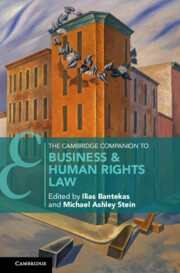Book contents
- The Cambridge Companion to Business & Human Rights Law
- Cambridge Companions to Law
- The Cambridge Companion to Business & Human Rights Law
- Copyright page
- Contents
- Figures and Tables
- Contributors
- Preface
- Cases
- Abbreviations
- 1 Business and Human Rights
- 2 Reconciling International Human Rights with International Trade
- 3 Neoliberalism, State-Capitalism and European Ordo-Liberalism
- 4 Corporate Governance and Corporate Social Responsibility
- 5 The Role of Business in International Development and the Attainment of the Sustainable Development Goals
- 6 The Business Case for Human Rights
- 7 The UN Guiding Principles on Business and Human Rights and Its Predecessors
- 8 The Regulatory Framework of Multinational Enterprises
- 9 The UN Global Compact and the OECD Guidelines for Multinational Enterprises and Their Enforcement Mechanisms
- 10 Taxation and Business
- 11 Corporate Accountability for the Natural Environment and Climate Change
- 12 Corporate Accountability for Corruption and the Business Case for Transparency
- 13 Disability, Business and Human Rights
- 14 Gender, Business and Human Rights
- 15 The Business Sector and the Rights to Work and Just and Favourable Conditions of Work
- 16 Responsible Lending
- 17 Business and Human Rights Approaches to Intellectual Property
- 18 The Role of Human Rights in Investment Law and Arbitration
- 19 The Use of International Arbitration Tribunals for Business and Human Rights Disputes
- 20 Innovative Contractual Remedies with Indigenous Peoples
- 21 The Role of Ethics in Corporate Human Rights Impact Assessments
- 22 Addressing Human Rights Impacts in Sustainability Reporting
- 23 Leveraging the Consumer-Led Movement to Strengthen Sustainable Business
- 24 The Structural Complexity of Multinational Corporations and the Effect on Managing Human Rights Risks in the Supply Chain
- 25 Towards a UN Business and Human Rights Treaty
- Index
13 - Disability, Business and Human Rights
Published online by Cambridge University Press: 10 September 2021
- The Cambridge Companion to Business & Human Rights Law
- Cambridge Companions to Law
- The Cambridge Companion to Business & Human Rights Law
- Copyright page
- Contents
- Figures and Tables
- Contributors
- Preface
- Cases
- Abbreviations
- 1 Business and Human Rights
- 2 Reconciling International Human Rights with International Trade
- 3 Neoliberalism, State-Capitalism and European Ordo-Liberalism
- 4 Corporate Governance and Corporate Social Responsibility
- 5 The Role of Business in International Development and the Attainment of the Sustainable Development Goals
- 6 The Business Case for Human Rights
- 7 The UN Guiding Principles on Business and Human Rights and Its Predecessors
- 8 The Regulatory Framework of Multinational Enterprises
- 9 The UN Global Compact and the OECD Guidelines for Multinational Enterprises and Their Enforcement Mechanisms
- 10 Taxation and Business
- 11 Corporate Accountability for the Natural Environment and Climate Change
- 12 Corporate Accountability for Corruption and the Business Case for Transparency
- 13 Disability, Business and Human Rights
- 14 Gender, Business and Human Rights
- 15 The Business Sector and the Rights to Work and Just and Favourable Conditions of Work
- 16 Responsible Lending
- 17 Business and Human Rights Approaches to Intellectual Property
- 18 The Role of Human Rights in Investment Law and Arbitration
- 19 The Use of International Arbitration Tribunals for Business and Human Rights Disputes
- 20 Innovative Contractual Remedies with Indigenous Peoples
- 21 The Role of Ethics in Corporate Human Rights Impact Assessments
- 22 Addressing Human Rights Impacts in Sustainability Reporting
- 23 Leveraging the Consumer-Led Movement to Strengthen Sustainable Business
- 24 The Structural Complexity of Multinational Corporations and the Effect on Managing Human Rights Risks in the Supply Chain
- 25 Towards a UN Business and Human Rights Treaty
- Index
Summary
MNCs have a central role, responsibility, and opportunity to foment change globally in fulfilling the rights of persons with disabilities. In addition to improving theiremployment practices, MNCs can leverage their economic power to fulfil other aspects of the human rights of persons with disabilities within their purview by: making physical and virtual environments accessible; ensuring that vendors, distributors and supply chains require equal employment opportunity for workers with a disability, produce accessible products and services, and take affirmative actions to employ and advance in employment workers with a disability; acknowledging the existence and value of customers with disabilities and their households and friends; marketing to such individuals; developing data accumulation and accountability instruments, including human rights impact assessments (HRIAs); and creating a general culture of diversity, equity, and inclusion of differences that includes disability. Acting in this manner would bolster rarely helpful corporate social responsibility (CSR) and diversity schemes, and position the business sector to become human rights change agents.
- Type
- Chapter
- Information
- The Cambridge Companion to Business and Human Rights Law , pp. 283 - 307Publisher: Cambridge University PressPrint publication year: 2021

